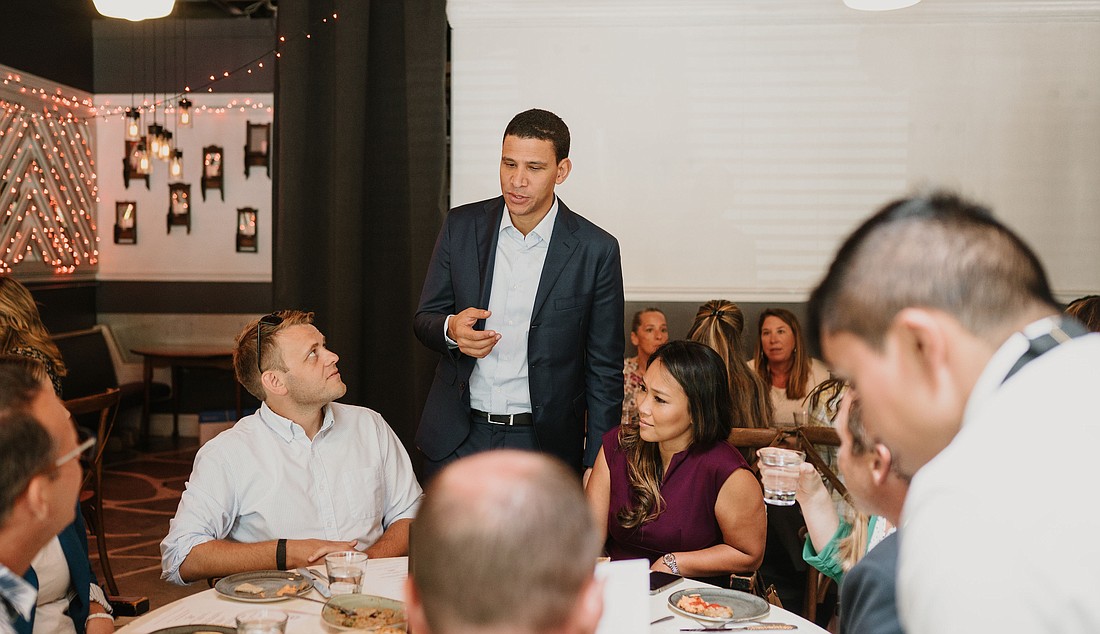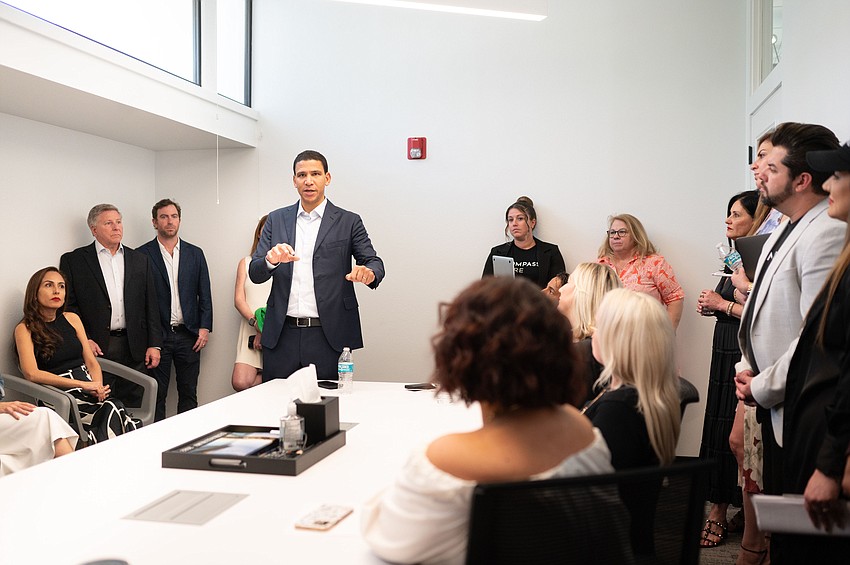- January 10, 2025
-
-
Loading

Loading

Robert Reffkin, the CEO and one of the founders of the real estate technology firm Compass, dropped into the company’s Sarasota office April 18 to meet agents from across the state’s West Coast.
This was one of about 100 office visits he makes every six months, something he sees as a way to connect with teams and to get a feel for what’s going on in the field.
The visit came as the New York City-based company continues to expand, especially in Florida where it now has 20 offices. The Sarasota office, downtown on Main Street, is one of the newest and is in a market Reffkin says is often on lists of “the top 10 list of places to live in the country.”
Compass was founded in 2012 and currently operates more than 300 offices in 72 markets nationwide. It has more than 28,000 agents, 97 of them working in Sarasota and Manatee counties. The company’s revenue fell 6% in 2022 to $6 billion. Transactions also fell 6%.
Reffkin says the biggest issue affecting Compass’ bottom line — and the industry’s as a whole — is rising interest rates. While higher rates have slowed demand among some buyers, the bigger problem is a large number of homeowners are holding on to their houses and in the process are creating a scarcity of inventory.
“The issue that we're facing is not a lack of buyers. Is it is not prices,” he says. “The real issue is that inventory is constrained because 30% of homeowners are locked into mortgage rates below 3%. And 72% of homeowners are locked into mortgage rates below 4%. And 85% of homeowners are locked in a mortgage rate below 5%.”
“So, if you have a 3% mortgage, you consider that a financial asset and you don't want to lose it.”
Until rates begin to fall, that lack of inventory will remain, he says, and the work Realtors do will continue to be difficult.
Reffkin, 43, a native New Yorker, is a graduate of Columbia University where he also earned an MBA. He’s worked for the global consulting firm McKinsey & Co., Goldman Sachs and served as a White House fellow. His mother Ruth work as a real estate agent, and that eventually drew him to the industry.
“I saw her as an entrepreneur, and a real business owner, a small business owner,” he says.
At 77 Ruth works at Compass in Miami and remains active in the business. Reffkin told the gathered agents that her focus these days is on developing referrals. “My mom is obsessed,” he says. “She's 77 years old and building her referral network.”
During the visit Reffkin spoke to the group, participated in a Q&A and sat down for an interview with the Business Observer. He spoke about his company, the state of the industry and passed along advice. Edited excerpts:

“The reality of today's market is that there's just not enough inventory. There are more buyers than sellers. There's demand across all the different price points and all the major geographies. We saw an early spring market, multiple offers, more foot traffic. This past weekend, we saw an open house with over 400 people. There's definitely more demand. the issue that we're facing as a real estate industry is not a lack of buyers. It is not prices. Price has not crashed and it's not going to crash in my opinion. As long as it's not a jobs-based recession, then there's going to be more buyers. Buyers don't know about Silicon Valley Bank going bankrupt and First Republic and those challenges. The average buyer knows there's a mortgage rate and they want to move and know that they have a job."
“That’s the single biggest issue by far in real estate, how many people are locked in. I think we're seeing a swing to rent, but then rents are going to go up. But then as mortgage rates go down, homes will feel cheaper, and they'll go back to the homes.
The figure Reffkin says will rates have to drop to spur both inventory and demand is 5.5%. "It just came out that 5.5% is viewed as the inflection point where the majority of people would feel like they would accept those rates.”
“Transactions right now are down in the first quarter about 30% year-over-year. But it was better than expected by a little bit, 5% to 10%. Over the course of the year, I expect transactions to be down closer to 15%. And the reason why is because the Q1 last year was a great Q1, but the rest of year started getting worse.”
“There's no one market right now. If you have a property that is unique and differentiated and move-in ready, it sells. If you have a property that looks like everything else and it has to be renovated, people do not want that. People want to pack their bags in New York and drop them in Florida. So, move-in ready is very important. The super high-end is stronger. People that had money still have money. And in the lower end market, it kind of depends on where mortgage rates are one week over another.”
“I think because in COVID people were so busy (working virtually) they almost think it could work. But now, it's not that market. Yeah, if business was just falling from the trees then maybe that works. But I think we, as a company, have to get back to where we were. Yes, there is digital, there is social. But there’s print. There’s postcards. There’s door knocking. There’s phone calls. There’s client gifts. Things that are in person. And I would highly recommend, and ask, that you do that as much as possible. I call it the 30% challenge. We all spend 30% more time in the office, 30% more time talking to each other in person, 30% more time sharing inventory in listings that are coming online with each other, 30% more time going to each other's open houses, or broker tours.”
“I saw agents as this large group, 1.5 million strong, of entrepreneurs. But on the other hand, I saw them as underserved customers. The companies that were working for agents I didn't feel had the capacity to give them everything they needed either because they didn't have enough money or because they didn't have enough vision. So we set out to raise $2 billion to invest in the future of the agent and help them better serve their buyers and sellers. And conversely, we are in the business of helping agents become better. The North Star is, anything an agent needs, Compass must provide. Now, have we done it all? No. But we're investing more along those lines than any other company. And that's why historically agents come to Compass, to grow their business. We give them a platform of programs and tools to help them grow. We have the technology support, but then the people support as well.”
“I never expected to fall in love with real estate agents. My mom has been an agent my entire life. But the reason I adore you so much is you’re entrepreneurs, and entrepreneurs dream big every single day. You're leaning in and being creative and your hard work, your talent. You create a business every day you wake up. You're a rare, human mind. Most people don't have the ability to deal with rejection in the same way you do. I think it’s your greatest superpower.”